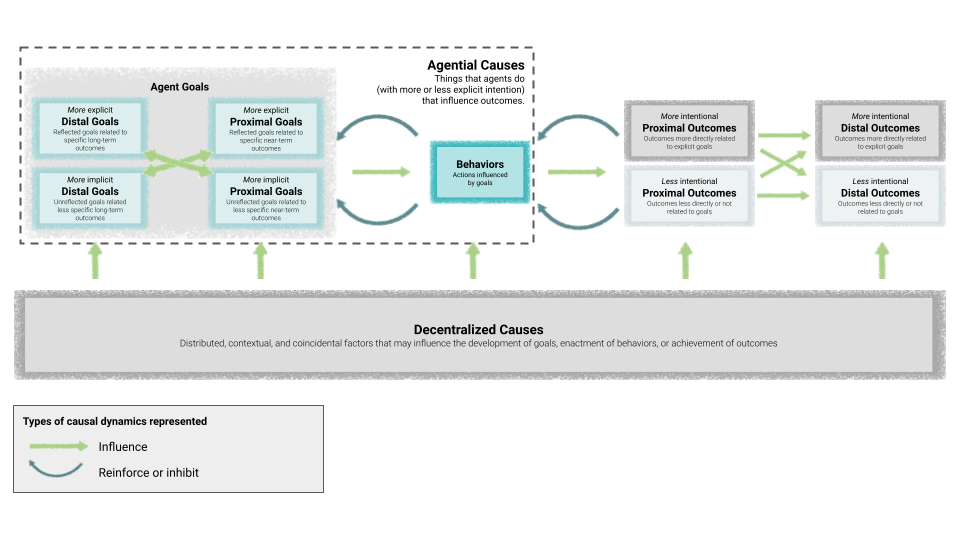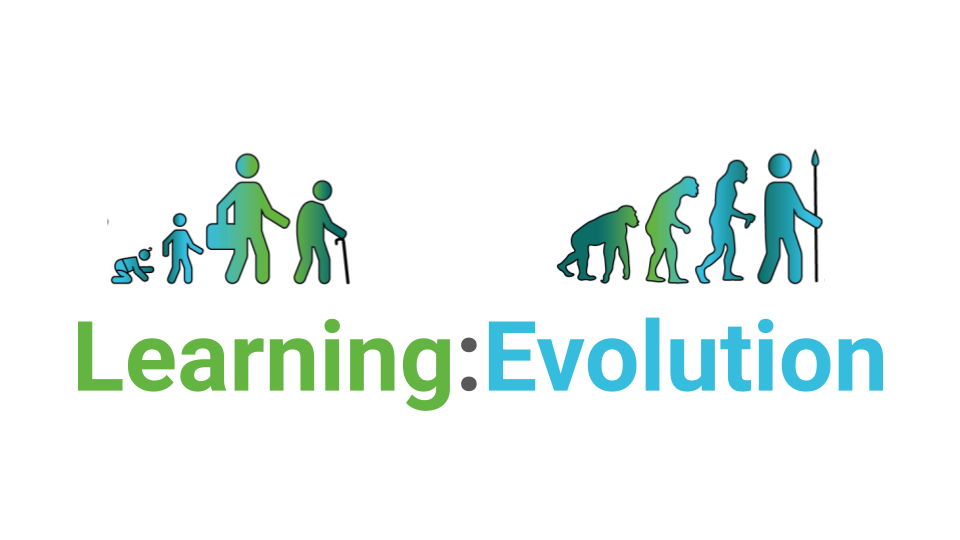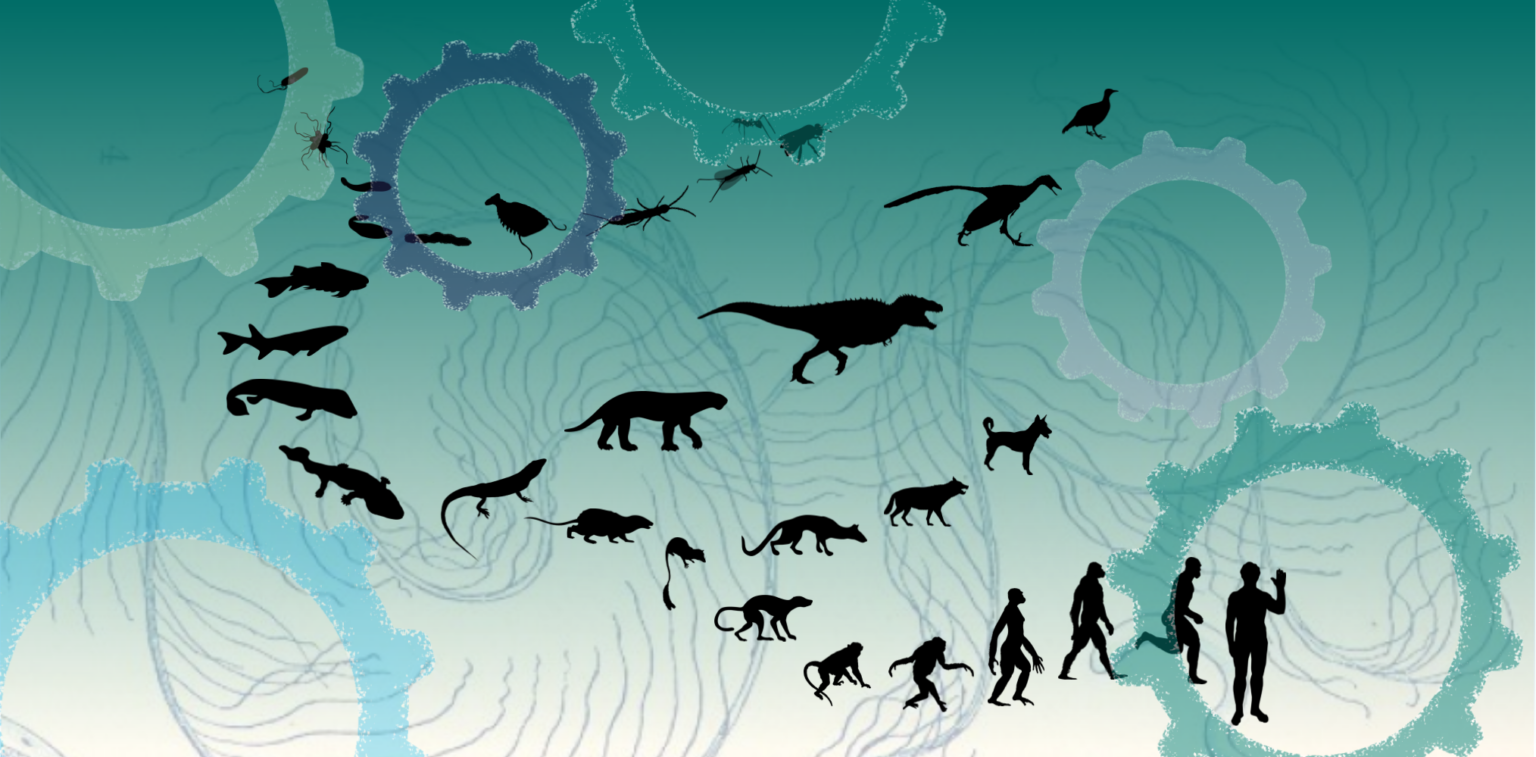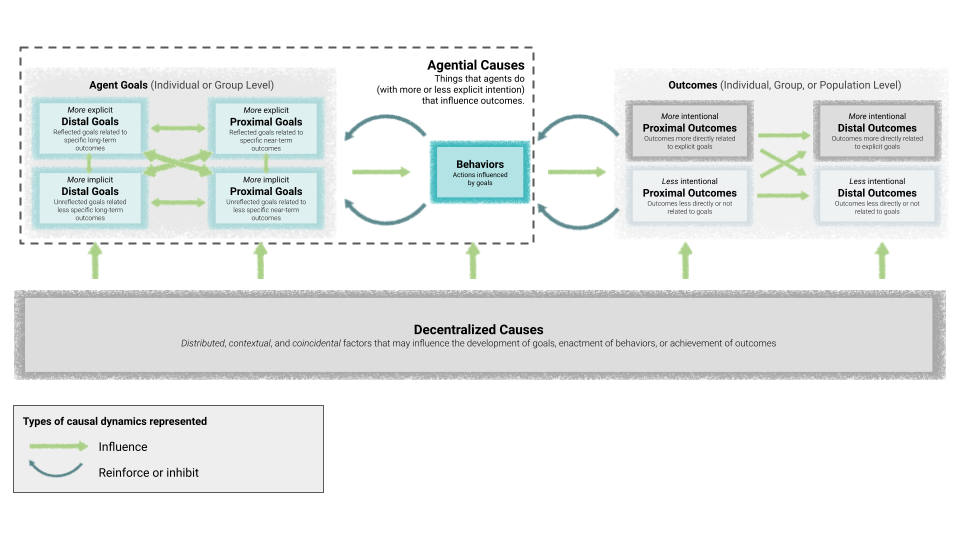Agency in Evolution Education
Perspectives for Educational Design Research
How can evolution educators help students develop capacities for scientific reasoning about the role of agency in evolutionary adaptation?
This is one of the more foundational questions facing the field of evolution education research, yet, there has hardly been a systematic approach to the question.
This page within our broader Understanding Agency project provides resources for educational design research focused on this space.
We offer Frequently Asked Questions as an introduction, more advanced Emerging Research Questions, as well as some potentially helpful references, for those who may want to contribute to these applied research aims.
A Toolkit for Educational Design Research
Helping students understand the complex relationships between goals, behaviors, and outcomes provides a neccessary foundation for everyday reasoning about society, as well as a precondition for reasoning about evolutionary change in biological systems.
Causal maps such as the graphic above, are one way to help students reason about these causes. The Triad, below is another tools that can help students reason about the interplay between agential and decentralized causes in evolutionary change.
Explore these and other conceptual tools for understanding agency, below.
Frequently Asked Questions
Agency is a new concept in evolution education, and so, you might have questions.
If your questions are not addressed below, please contact us
Simple answer: Agency is understood here as the capacity of an agent to act in a goal-directed way within an environment (see our minimal model). Sometimes these goal directed behaviors influence the enviromental conditons of “natural” selection, shaping evolutionary adaptations in new directions.
However: Different scientists, within and between disciplines, including within and between the sub-disciplines of evolutionary biology, all may hold very different conceptions as to the appropriate definition or application of a concept of “agency” in evolution (and for that matter, the same can be said for the concept of evolution). In our resources on OpenEvo, we are concerned with various notions of agency:
- Biological Agency (sensu Levin & Dennett 2020; Sokol et al. 2015)
- Psychological Agency (sensu Tomasello 2022; Sokol et al. 2015)
- Socio-Cultural Agency (sensu Tomasello 2022; Sokol et al. 2015)
- Computational Agency (sensu Rahwan et al. 2019; Levin & Dennett 2020)
Not exactly.
Some scientists do believe that the value of Darwin’s thinking about evolution is primarily, or perhaps only found in how it helps us understand how the apparent design of biology can emerge without an outsider designer (e.g. a god), or the actions of the individual (e.g. as Lamarck had theorized before Darwin). That is, these scientists believe the value of Darwin’s evolutionary theory was its framing of decentralized causes, those factors not significantly influenced by the goal-directed behaviors of any agents.
However, other scientists look at Darwin’s thinking, and the work that has followed, and see the value in reasoning about both decentralized causes, as well as those more proximally or distally driven by the goal-directed behaviors of agents within the system (agential causes in the natural world). You can read more in Hanisch & Eirdosh (2021), our article on causal mapping and teleological reasoning.
Reasonable scientists and other humans can and do disagree on this aspect of the science.
However, scientific literacy in evolution should be defined by an ability to reason about both decentralized and agential causes in processes of evolutionary adaptation, and the possible interactions between them.
That is, a central conceptual aim of evolution education is to support the metacognitive co-regulation of agential and decentralized reasoning (similar to arguments made by González Galli et al 2020; Perez et al 2022).
In that context, it can also be said that a central aim of evolution education includes helping students to refine and develop their own agential thinking in ways that are scientifically adequate and practical for the communities and global society they inhabit.
Absolutely not!
The conceptions of agency within evolution that are described within OpenEvo pertain to naturalistic, science-based thinking about the origins, diversity, and flexibility of goal-directed behaviors in the world.
Sometimes, some scientists or educators that are concerned with issues of creationism or intelligent design are hesitant to discuss or clarify concepts of agency for fear that misconceptions may emerge. However, we feel misconceptions are more likely if we do not give students the opportunity to explicitly reflect on scientifically adequate models of goal-directed behaviors in evolutionary biology.
We unequivocally reject the scientific merits of any arguments that invoke a supernatural creator or intelligence beyond the scope of a naturalistic science.
We recommend that educators concerned with preventing or reducing Creationist beliefs use a combination of Culturally Competent teaching methods (see Barnes & Brownell 2017), combined with a conceptual learning approach that adequately covers the relationships between agency and evolutionary adaptation.
Definitely not!
Many students begin their learning journey into evolution science by learning about artificial selection and domestication, for example, within the context of agriculture. Thus, for many, our first example of evolution will be one that integrates both agential and decentralized causes (farmers have goals, but they don’t control all aspects of the adaptive changes within populations on their farm).
Further, thinking about the minds, goals, behaviors, and outcomes of those agents around us, is a very intuitive, and potentially helpful way of understanding the world, when applied critically. Thus, while it is an open question for educational design research as to the best scope and sequence of content, it is likely that even primary school students can productively reflect on some aspects of the relations between agential and decentralized causes in ways that prepare them for everyday life, and scientific literacy.
Emerging Research Questions
Understanding agency in the context of evolution education presents a vast landscape of opportunities and challenges for educational design researchers. Below, we outline some example and emerging questions identified within our Educational Design-Based Research Model. We also welcome collaborations in new directions related but not listed here.
If you are interested in exploring research possibilities in these areas, please contact us to discuss further.
What is the role of prior understandings of agency in reasoning about evolutionary adaptation?
Agential cognition (thinking in terms of agents with goals) is built, developmentally, on top of the core of our uniquely human genetic starter kit for social cognition (sensu Heyes 2018). In this context, how cultures of scientific thinking engage and reshape innate human agential cognition represents one of the most pressing issues in science education broadly, and evolution education specifically.
Evolution education has, traditionally, ignored student preconceptions of agency, instead focusing on either suppression or repression of agential thinking in pursuit of decentralized forms of reasoning. For that reason, little is known about students’ prior understanding of agency as a generalizable concept itself, and in relation to other evolutionary concepts. Given the role of prior learning in scientific learning trajectories, this area is particularly critical to illuminate with empirical research.
Thus, educational design researchers face a landscape of questions to clarify the possible, preferable, and optimal learning trajectories for the full diversity of global learners.
How should school systems scaffold and structure student understanding of agency in biology and society?
For some in the field of evolution education research, there is conventional wisdom that suggests the proper target of secondary-level general education in evolution should be to help students strongly dichotomize evolutionary biological explanations as non-agential, against cultural explanations, as fully agential (see Kampourakis 2020).
Our work in the Understanding Agency project suggests an alternative space of learning trajectories, in which agential and decentralized causes are concepts that must be metacognitively co-regulated (similar to arguments made by González Galli et al. 2020; Perez et al. 2022). That is, we must become aware of the conceptual relations between agential and decentralized thinking in our developing explanations of the world around us. In this view, “evolutionary” and “cultural” explanations should be not dichotomized, but rather, the interdependence of agential and decentralized causes should be reflected on, across cases in biology and society.
Thus, educational design researchers face a landscape of questions to clarify the possible, preferable, and optimal learning trajectories for the full diversity of global learners.
What are the appropriate conceptual boundaries of agency for biological education?
What counts as an agent? What exactly is agency?
When precisely did agency evolve?
These are BIG questions in biology (and other fields!), and, therefore, there exists widely divergent expert disagreement on the answers.
Thus, educational design researchers face a landscape of questions to clarify the possible, preferable, and optimal learning trajectories for the full diversity of global learners.
How can students best learn about the role of behavior as selection pressure?
While the concept of agency is steeped in conceptual complexity and controversies, one important and under explored aspect that is far less complex and not controversial, is that of behavior as selection pressure. Similar to ways that the behaviors of a predator, mate, or domesticator can influence the evolutionary change of a species, so also the behavior of individuals and groups within the species itself can also bias or drive adaptive evolutionary changes in unique directions.
Thus, educational design researchers face a landscape of questions to clarify the possible, preferable, and optimal learning trajectories for the full diversity of global learners.
Other tools for Understanding Agency
Deepen your understanding of agency across diverse contexts through other resources in the collection.

Understanding Agency
Tools for thinking about the origins, diversity, and flexibility of goal-directed behaviors

Goals, Behaviors, and Outcomes
How can we understand the causal relationships between goals, behaviors, and outcomes?

The Learning:Evolution Analogy
Learning and Evolution are processes that are both similar and different, in important respects. What can humans learn by comparing these processes?

The Decentralized Self
The human brain is the seat of human agency, and yet this agency is caused by cellular agents unaware of our larger human goals.

EvoFlex
A collaborative project space for developing open tools for research into the evolutionary reasoning of students, experts, and AIs.
References and further reading
- Barnes, M. E., & Brownell, S. E. (2017). A call to use cultural competence when teaching evolution to religious college students: introducing religious cultural competence in evolution education (ReCCEE). CBE—Life Sciences Education, 16(4), es4.
- González Galli, L., Peréz, G., & Gómez Galindo, A. A. (2020). The self-regulation of teleological thinking in natural selection learning. Evolution: Education and Outreach, 13(1), 1-16.
- Hanisch, S., & Eirdosh, D. (2021). Causal mapping as a teaching tool for reflecting on causation in human evolution. Science & Education, 30(4), 993-1022.
- Hanisch, S. & Eirdosh, D. (in review). Teaching for the interdisciplinary understanding of evolutionary concepts.Chapter in du Crest et al. (forthcoming). Evolutionary Thinking Across Disciplines.Problems and Perspectives in Generalized Darwinism. http://dx.doi.org/10.13140/RG.2.2.19260.31365/1
- Heyes, Cecilia. Cognitive gadgets: The cultural evolution of thinking. Harvard University Press, 2018.
- Kampourakis, K. (2020). Students’ “teleological misconceptions” in evolution education: why the underlying design stance, not teleology per se, is the problem. Evolution: Education and Outreach, 13(1), 1-12.
- Levin, M., & Dennett, D. C. (2020). Cognition all the way down. Aeon Essays.
- Okasha, S. (2018). Agents and goals in evolution. Oxford University Press.
- Perez, G., Galindo, A. A. G., & Galli, L. G. (2022). Metacognitive Regulation of Essentialism in the Teaching of Evolution. Interdisciplinary Journal of Environmental and Science Education, 18(4), e2295.
- Sokol, B. W., Hammond, S. I., Kuebli, J., & Sweetman, L. (2015). The development of agency. Handbook of child psychology and developmental science, 1-39.
- Tomasello, M. (2022). The Evolution of Agency: Behavioral Organization from Lizards to Humans. Penguin Random House.


